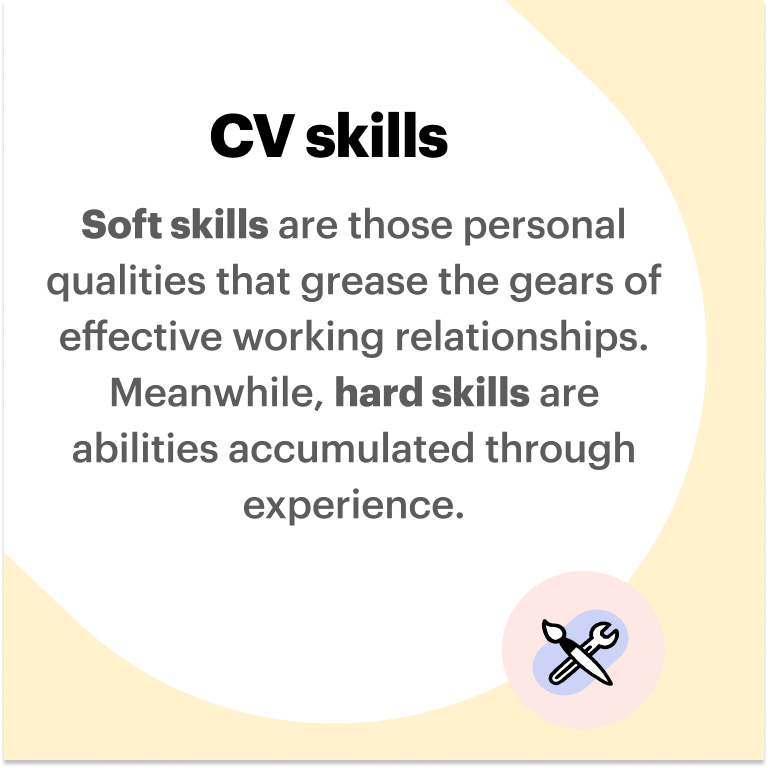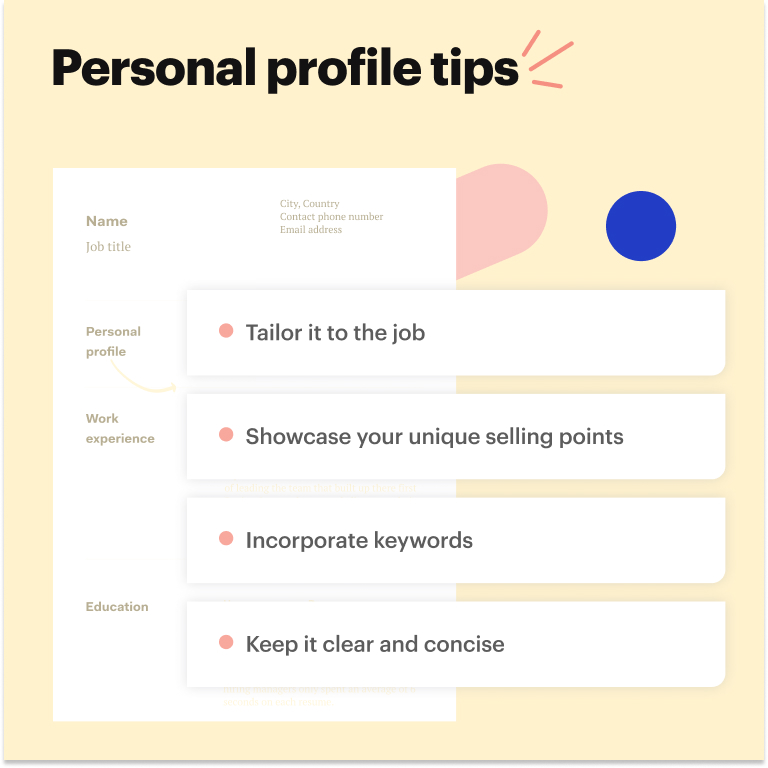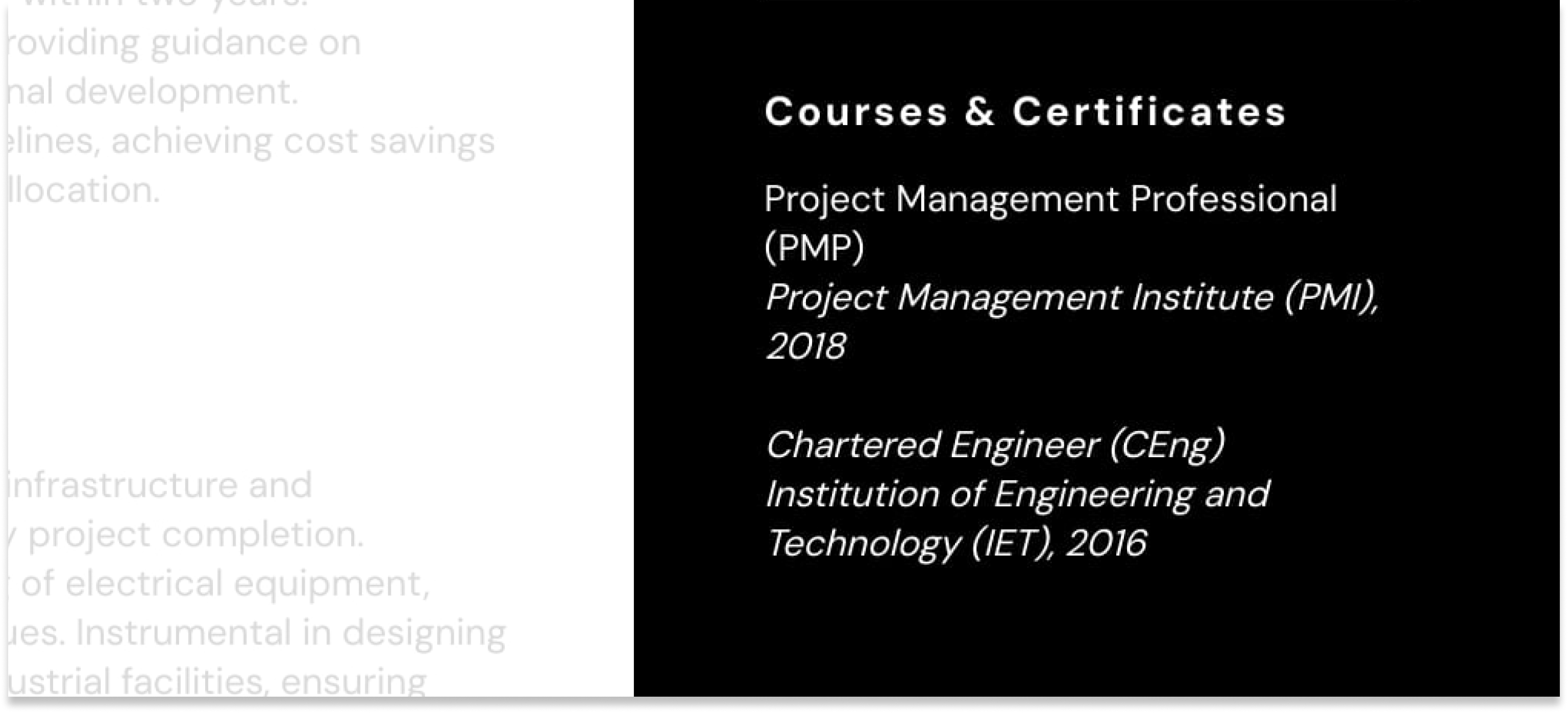
How to Write an Electrical Engineer CV: 5 Steps to Job Search Success
Electrical engineers are pivotal in designing, developing and maintaining electrical systems across various industries. Construction, automotive, energy, defence and aerospace are willing to pay highly for individuals with strong analytical skills, a keen eye for detail and a passion for problem-solving.
Learning how to write a good CV is your best ticket to success in this competitive field, effectively showcasing your qualifications, skills and experience. This article provides a comprehensive guide to writing an electrical engineer CV in the UK complete with industry examples and relevant tips.
Get a head start by exploring our CV templates and see examples of a modern CV that will help you shine in the eyes of potential employers and play nicely with application tracking systems (ATS).
In this article, we cover:
What to include in your electrical engineering CV
How to best format each section
Creating a powerful personal profile
Examples of correctly including work experience and education.

Electrical engineer CV example

Daniel Rogers, an electrical engineer with eight years of experience, selected the California CV template to showcase his expertise. He seamlessly combines senior experience, core skills and additional certificates in project management with a strong work ethic and chartered status. With a deep understanding of electrical engineering, Daniel presents himself as the complete package.
What to include in an electrical engineer CV
An effective electrical engineer application shares similarities with other technical professions such as electrician, construction and engineer. As well as demonstrating precision, problem-solving skills and a thorough understanding of technical systems, you should also be prepared to apply for multiple roles across industries. To make things easier, we recommend starting with a master CV - an all-inclusive document detailing all your experience, skills and qualifications. This can then be refined as needed for job-specific applications.
Here are the core elements of a well-rounded electrical engineer CV:
Personal and contact information
Personal profile
Skills
Work experience
Education
Additional certifications.
Learn more about the ideal CV length for the job you are applying for to keep your CV concise and compelling.

Remember, a stand-out CV for an electrical engineer needs an equally top-notch cover letter, especially if you plan on applying for jobs via email. Take a look at our articles on civil engineer cover letter and engineer cover letter for inspiration.

How to write an electrical engineer CV: 5 steps with examples
1. What are the key skills for an electrical engineer CV?
Electrical engineering is a highly-trained profession requiring a knowledge of science and engineering as well as mathematics to name a few. Correctly listing your skills on your CV is crucial to highlight your expertise and suitability for the role. Transferable skills from professions like mechanic and civil engineer can also be valuable, as these roles share competencies including complex problem-solving, project management and persistence.

Five essential skills for an electrical engineer:
Circuit design and analysis: Ability to design, simulate and analyse electrical circuits to ensure proper function and safety.
Power distribution systems: Knowledge of designing and managing power distribution networks to ensure efficient energy delivery.
Control systems: Expertise in designing and implementing control systems for automation and industrial applications.
Renewable energy solutions: Proficiency in developing and integrating renewable energy sources like solar and wind into existing power grids.
Project management: Skills in planning, executing and overseeing electrical engineering projects, ensuring they are completed on time and within budget.
| Hard skills | Soft skills |
|---|---|
| AutoCAD and MATLAB proficiency | Problem-solving |
| Electrical safety standards knowledge | Communication |
| PLC programming | Team collaboration |
| Electrical testing and troubleshooting | Time management |
| Schematic diagram creation | Critical thinking |
2. How to write a personal profile for an electrical engineer CV
A personal profile on a CV is crucial as it provides a snapshot of your qualifications, key soft skills and professional motivations, which employers want to see within seconds. This section helps you stand out and sets the tone of your document by highlighting your unique attributes and career goals.

Electrical maintenance engineer CV personal profile example
Experienced electrical maintenance engineer with 8 years of experience and specialising in industrial and commercial systems. Skilled in troubleshooting, repair and preventive maintenance of complex electrical systems. Holder of the Certified Maintenance & Reliability Professional (CMRP) certification. Strong track record of reducing downtime and improving system reliability. Full UK driving licence.
Electrical design engineer CV personal profile example
Innovative electrical design engineer with 3 years of experience and expertise in circuit design and system integration. Proficient in AutoCAD and MATLAB, with a focus on developing efficient and cost-effective solutions. Certified as a Professional Engineer (PE) and committed to continuous improvement and staying updated with industry advancements.
Electrical project engineer CV personal profile example
Results-driven electrical project engineer with 6 years of experience and extensive knowledge in managing large-scale projects from conception to completion. Strong leadership and organisational skills, with a focus on delivering projects on time and within budget. PMP certified and adept at coordinating multidisciplinary teams and ensuring adherence to safety standards.
Electrical commissioning engineer CV personal profile example
Dedicated electrical commissioning engineer with 5 years of experience and a proven ability to ensure systems operate as intended. Expertise in testing, troubleshooting and optimising electrical installations. Certified Energy Manager (CEM) with strong communication skills and attention to detail, committed to ensuring project success and client satisfaction.
Pro tip
Many electrical engineering roles require a driver's licence for on-the-road assignments or work in remote locations. The personal profile is a good place to mention you hold a full UK licence.
If you are a student or recent graduate entering the workforce, consider focusing on your motivations, skills developed through work experience and relevant educational projects.
Electrical engineer student CV personal profile example
Highly motivated electrical engineering student with a strong foundation in circuit design, power systems and renewable energy. Proven problem-solving abilities through hands-on project work and internships. Member of the Institute of Electrical and Electronics Engineers (IEEE), eager to apply academic knowledge and gain practical experience in a dynamic engineering environment.
Take a look at more personal profile examples for similar roles such as computer scientist, technical writer, or management consultant.

3. How to include practical work experience
Including a comprehensive work experience CV section is vital for electrical engineers. This role requires constant practice and a history of trusted professionalism. Your work experience section is essential for building that trust and demonstrating your ability to handle real-world challenges effectively. And remember the power of using action verbs like ‘arranged’, ‘facilitated’ or ‘developed’.
Pro tip
Safety and efficiency are paramount in electrical engineering roles. Be sure to underscore your commitment to both when appropriate, especially if you have results to back it up.
How to format your work experience entries
We suggest formatting work experience entries as one short paragraph outlining duties and your impact in the role, with two or three bullet points with quantifiable achievements. If you’re still building your professional experience, look at how an apprenticeship, internship or skills-based roles show a well-rounded background on a CV.

Electrical engineer | BYE Systems, York | 2018 – Present
Responsible for designing and implementing electrical systems for commercial and residential projects and improving energy efficiency. Team lead of five engineers developing a new control system and reducing client production costs. Conducted regular maintenance and troubleshooting, ensuring compliance with safety standards.
Increased system efficiency by 30% through innovative circuit designs.
Reduced downtime for clients by 25% with proactive maintenance strategies.
Implemented safety protocols resulting in a 15% decrease in accidents.
Senior electrical design engineer | Faering Engineering, Stoke-On-Trent | 2021 – 2023
Spearheaded the design and integration of electrical systems for high-rise buildings and industrial facilities. Managed a team of junior engineers, providing mentorship and guidance on complex projects. Improved project turnaround time through process optimisation and effective resource management.
Enhanced design accuracy by 20% through rigorous testing and feedback.
Led projects that were under budget by 15% on average.
Achieved a 95% client satisfaction rate for completed projects.
EV electrical engineer | Green Auto Tech, Hull | 2017 – 2023
Developed electrical systems for electric vehicles, enhancing battery efficiency and reducing charging time. Collaborated with cross-functional teams to integrate new technologies into vehicle prototypes. Increased energy efficiency through innovative design solutions.
Improved battery life by 20% through advanced power management.
Reduced production costs by 10% with streamlined processes.
Received the company's Innovation Award for sustainable engineering solutions.
Electrical site engineer | Monster Construction, Ashby-De-La-Zouch | 2016 – 2022
Supervised the installation and testing of electrical systems on construction sites, ensuring compliance with project specifications. Coordinated with contractors and suppliers to ensure timely delivery of materials and equipment. Successfully completed projects ahead of schedule, resulting in significant cost savings.
Reduced project completion time by 20% through effective management.
Ensured 100% compliance with safety regulations.
Improved site productivity by 15% through enhanced coordination.
Graduate electrical engineer | Internship at GHI Energy, Glasgow | 2022 – 2022
Assisted in designing and testing renewable energy systems, gaining hands-on experience in solar and wind power projects. Conducted research and analysis to support senior engineers in project planning and execution. Developed a keen understanding of industry standards and best practices through practical experience and mentorship.
Contributed to a 10% increase in project efficiency by applying research findings.
Assisted in reducing project costs by 5% through effective resource management.
Gained practical experience with industry-standard software tools.
If you want to become an electrical engineer with little to no practical experience, consider focusing on in-demand soft skills or taking relevant courses. Similarly, obtaining professional membership and seeking internships or apprenticeships can help build the necessary skills.
4. How to include education on an electrical engineer CV
Formatting the education section on your CV correctly is crucial for skilled roles. Similar to positions in IT, data science or project management; electrical engineer roles often require A-Levels plus a university degree or college diploma. Here’s how to format your education section to quickly show you have the foundational education needed.

How to format a university degree
Format your university degree detailing the institution, program name and year of completion. If space allows, consider adding relevant modules or coursework. If you hold an undergraduate or postgraduate university degree it is not always necessary to list A-Levels or GSCEs in addition. However, you should do so if they are included in the job requirements.
Bachelor of Engineering (BEng) in Electrical Engineering | University of Central Midlands | 2017
Relevant coursework: Circuit Analysis, Control Systems, Power Electronics
How to format a vocational diploma
Similarly, with a vocational qualification or college diploma list only your highest level of education including the name of the program, issuing institution, year of completion plus relevant modules or coursework if space allows.
BTEC Level 5 Higher National Diploma in Engineering | Bradford College | 2023
Relevant modules: Engineering Design, Engineering Maths, Professional Project
How to format A-Levels education
If you are a student who is yet to complete a college diploma or university degree, list your A-Levels with the subject, grade and issuing institution.
A-Levels | Country Durham College | 2012 – 2014
Mathematics (A), Physics (A), Chemistry (B)
How to format GCSEs education
If you are a school leaver working your way into the profession through practical training, list your most recent formal education (GCSEs or equivalent) stating the number of certificates obtained alongside the most relevant subjects including the grade, date of completion and awarding body.
GCSEs | Cunningham High School | 2010 – 2012
10 GCSEs including Mathematics (A), Physics (A), English (B)
5. How to add courses and certificates
Including courses and certificates on a CV for an electrical engineering role is important as additional professional courses and certificates are highly recommended to stand out in this competitive and highly qualified profession. Here’s how to format this section for an electrical engineer CV.

Incorporating additional qualifications can significantly enhance your electrical engineering CV, demonstrating a commitment to professional development and mastery of your field. For more advice on including courses and certificates, refer to other CV examples such as firefighter, academic, or developer.
Key takeaways
Highlight essential skills: Emphasise hard and soft skills relevant to electrical engineering. Start with a master CV detailing all experience, skills and qualifications, refining it for specific job applications.
Craft a strong personal profile: Create a concise personal profile highlighting key qualifications, certifications and career goals. This snapshot should convey your suitability for the role, key soft skills and motivations.
Build trust through work experience: Include comprehensive work history entries showcasing duties, impact and quantifiable achievements to build trust in this field.
Format education correctly: Clearly present your highest level of education, detailing the institution, program name and relevant coursework or modules. Help employers see you have the foundational knowledge required for the role.
Include relevant certificates: List additional professional courses and certifications to stand out. Highlight qualifications such as PMP, CEng and CMRP to show your commitment to professional development.
Next steps?
Iron out any creases using our intuitive CV maker with 20+ CV templates and professional designs to choose from. To accompany your CV, discover our cover letter templates. If you don’t want to leave anything to chance, connect with our professional CV Writing Service.
Draw inspiration from our career blog for tips on how to save time by tracking job applications and how to improve your CV to make the best impression with hiring managers.
FAQs
What does an electrical engineer do?
Electrical engineers design, develop and maintain electrical systems and components to ensure they function safely and efficiently. They work on a wide range of projects, including power generation, transmission and distribution systems, as well as electronic devices, control systems and renewable energy solutions. Their responsibilities include circuit design, system analysis, troubleshooting and project management. Electrical engineers can be found in various industries, such as construction, automotive, aerospace, energy and defence, where they play a crucial role in ensuring the reliability and efficiency of electrical infrastructure.
How much do electrical engineers make?
In the UK, the salary of an electrical engineer varies based on experience, location and industry. Entry-level electrical engineers can expect to earn between £25,000 and £35,000 per year. Mid-career professionals with several years of experience typically earn between £35,000 and £50,000 annually. Senior electrical engineers and those in specialised or managerial roles can earn upwards of £60,000 per year. Salaries may also be higher in sectors such as oil and gas, aerospace and certain high-demand regions. Additionally, certifications and advanced qualifications can positively impact earning potential.
How do I become an electrical engineer?
To become an electrical engineer in the UK, start by obtaining a bachelor's degree in electrical engineering or a related field. This foundational education covers essential topics such as circuit theory, electronics and power systems. Gaining practical experience through internships, apprenticeships or entry-level positions is crucial. Consider obtaining professional certifications such as Chartered Engineer (CEng) status from the Institution of Engineering and Technology (IET). Continuous learning through courses and advanced degrees can enhance your skills and career prospects. Staying updated with industry trends and technologies is essential for long-term success.
Are online electrical engineers in demand in the UK?
Yes, online electrical engineers are increasingly in demand in the UK, particularly due to the rise of remote work and digital transformation across industries. These professionals support virtual project management, remote troubleshooting and online collaboration for electrical engineering tasks. Industries such as renewable energy, telecommunications and automation are driving the need for skilled online electrical engineers who can design, analyse and maintain electrical systems remotely. The demand for these roles is expected to grow as more companies embrace remote work and digital solutions to improve efficiency and reduce costs.
What qualifications do I need to become an electrical engineer?
To become an electrical engineer in the UK, you typically need a bachelor's degree in electrical engineering or a related field. Relevant qualifications include BEng (Bachelor of Engineering) or MEng (Master of Engineering) degrees. Additionally, gaining professional certification, such as Chartered Engineer (CEng) status from the Institution of Engineering and Technology (IET), can enhance your credentials. Practical experience through internships, apprenticeships or entry-level positions is essential. Advanced courses and certifications in specialised areas, such as project management (PMP) or maintenance reliability (CMRP), can further bolster your qualifications and career prospects.

